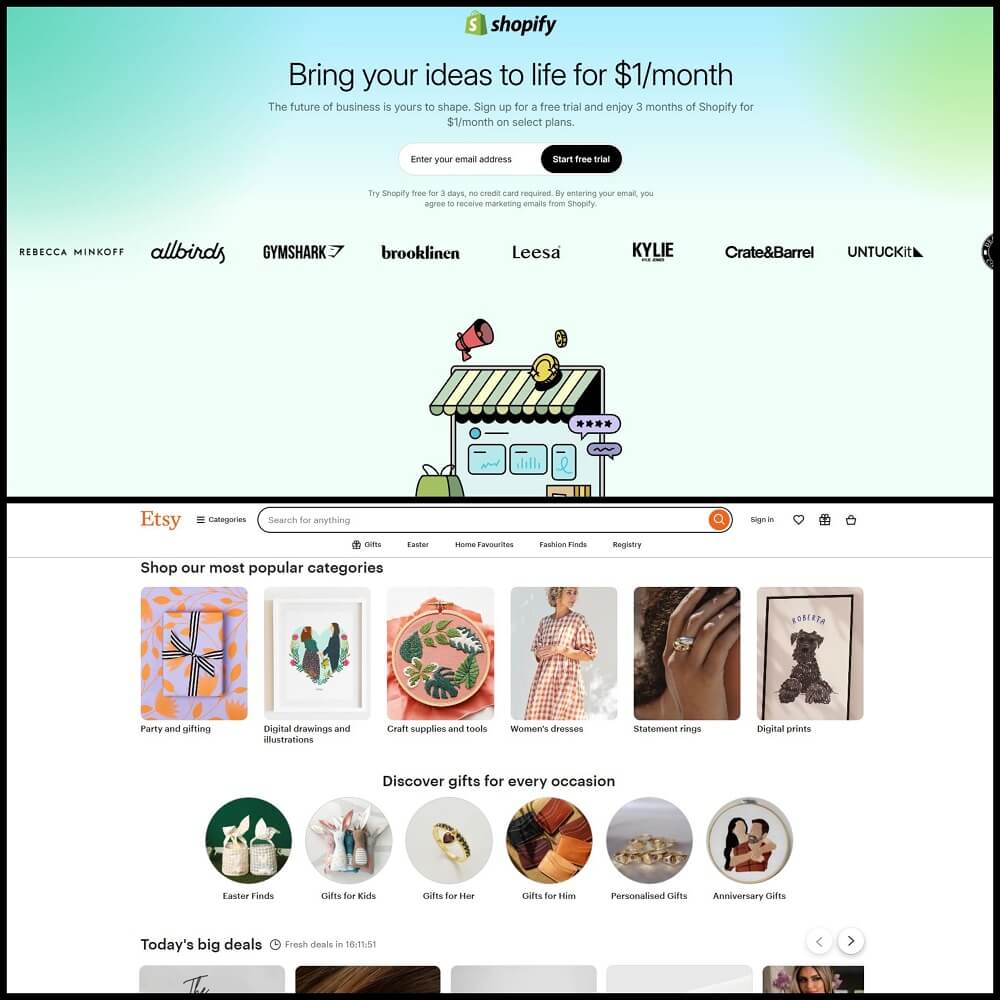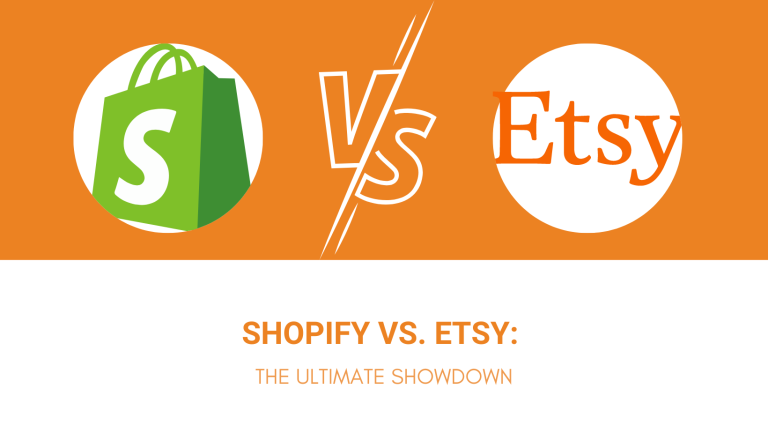If you’re planning to dive into the world of eCommerce, you might have heard about Shopify and Etsy.
Both digital platforms have made a huge name for themselves, but they aren’t as similar as most people think.
Each serves a different purpose and offers its own unique features to help you achieve your business goals.
Shopify is a website builder that lets you create your own branded online store. It gives you full control over your site, pricing, and customer relationships.
Etsy is a marketplace designed for handmade, vintage, and unique products. It provides instant access to a built-in audience but comes with more restrictions on branding and customization.
If you’re torn between the Shopify vs. Etsy debate, then let’s help you make the right choice.
We’ll have a detailed comparison of the two platforms so you can decide which is more suitable for your selling journey.
Let’s get started!
The Main Differences Between Shopify and Etsy

The biggest difference between Shopify and Etsy is how they operate. Shopify is an online store builder, giving you full control over your website, branding, and pricing. Etsy is a marketplace, where you sell alongside other handmade, vintage, and craft supply sellers.
Shopify offers powerful customization tools, plugins, and SEO features to help you build and grow your store. However, it doesn’t bring in customers for you, you’ll need to market your business.
Etsy, on the other hand, has a built-in customer base, making it easier to get discovered. But it has stricter product restrictions and fewer branding options.
In the next sections, we’ll compare Shopify and Etsy based on key factors like fees, customization, customer reach, scalability, and marketing tools to help you decide which platform suits your business best.
| Criteria | Shopify | Etsy |
| Features | Comes packed with eCommerce tools and features to make store management easier. | Offers some basic yet powerful tools for store management, but nothing too fancy. |
| Pricing | Has three pricing plans: Basic, Shopify and Advanced ranging from $29 – $299 | Regular plan doesn’t charge a fee, while Plus Plan costs $10/month. |
| Payment Options | More than 100 payment gateways including Shopify Payments which does not charge an additional transaction fee. | Supports most of the mainstream payment gateways including PayPal, Gift Cards and Debit/Credit Cards. |
| Domain & URL | It’s easy to buy a custom domain name for your Shopify store. | Your store comes under the umbrella of Etsy marketplace, so you can’t buy a custom domain name. |
| User-Friendliness | Simple and intuitive UI, but slight technical knowledge can come in handy. | Also has a clean UI and doesn’t require any technical knowledge. |
| Design Flexibility | You can fully customize the appearance and functionality of your site. | You can only customize your site logo, product images and descriptions. |
| Product Limit | There’s no limit or additional charges to the number or type of products you sell. | Only allows handmade, vintage and unique products. You also need to pay $0.20 to add a new product. |
| Marketing and Branding | Requires more effort in marketing, but it’s easier to create a brand. | Difficult to create a brand, but you do not require too much marketing. |
| Traffic and Exposure | You need to build a store from scratch and create an online presence. | You get access to an already established customer base. |
| Shipping and Dropshipping | Shopify Fulfilment Network for shipping and plenty of tools and apps to support dropshipping. | Shipping is fulfilled by 3PL services and is not the ideal platform for dropshipping. |
| Scalability | Perfect for all businesses regardless of size. | Not recommended for medium to large-scale businesses. |
| Security | A free SSL certificate is included in every plan. | Website management provides security to both buyers and sellers. |
| Customer Support | 24/7 customer support through live chat and phone. | 24/7 live chat is available but sometimes customer support isn’t responsive. |
Detailed Comparison of Shopify and Etsy
Now that you have a general idea of how these platforms work, let’s see how they fare against each other in a direct comparison.
1. Features (eCommerce Tools)

Running an eCommerce store can become a nightmare if you don’t have the right tools.
So, let’s get started with Etsy which offers some basic, yet, pretty useful eCommerce features to help you manage your store.
If you’re always on the run then you can download the “Sell on Etsy” app from Google Play or Apple Store. The app offers a ton of features including:
- Update, renew or directly add and publish new listings on the spot.
- Instant notifications when a customer purchases from your store or sends you a message.
- Allows you to keep tabs on the views, orders, and sales history from your phone.
- Helps you manage your orders, update the shipping notifications and lets you add private notes.
You can also share your Etsy store on social media platforms like Facebook, Twitter, and Instagram and then market it using Google Shopping and other tools to further increase the traffic.
Aside from that, upgrading to the Etsy Plus Plan also gives you access to a variety of different features such as:
- Advanced shop customization features.
- Email alerts for customers.
- Access to discounts on custom web addresses.
Overall, these tools might not be too fancy, but they’re more than enough for small-scale entrepreneurs selling handmade products.
Moving on, Shopify has all the eCommerce tools and features you can think of. With its 70+ professional themes, you can customize your site to make it look exactly the way you want it to.
Shopify doesn’t put restrictions on the number or type of items either, as long as you’re abiding by its Acceptable Use policies.
In addition, there are a ton of third-party apps and plugins that you can use to add your desired functionality to your store. But bear in mind that most of these add-ons come at a cost.
And while all of the Shopify plans cost a subscription fee, they also offer plenty of neat features such as:
- Tools to manage your orders and inventory
- Calculations for third-party shipping rates
- Free SSL certificate
- Cart recovery and SEO tools
- Multichannel selling to reach more customers
This is just the tip of the iceberg of the total number of Shopify’s tools. We’d need to write a whole new post if we were to list them all, so you get the idea.
The Verdict
It’s clear that Shopify is the winner here because it allows you to customize every aspect of your store, thanks to the abundance of tools and plugins it offers.
With that said, we’re not discrediting Etsy’s toolkit in any way either because it is perfect for small-scale business owners. Yet, it pales in comparison to Shopify.
2. Pricing

Pricing plays a huge role in influencing our decision, especially if we’re on a tight budget.
So if you’re starting a business with low investment, then Etsy would be the favorable choice.
The reason is that the Standard Plan of Etsy doesn’t charge you any subscription fee. If you don’t have time to manage your store, you at least won’t have to worry about getting charged.
However, Etsy also has a Plus Plan that comes at a cost of $10/month – which isn’t too bad either. We already discussed some of the features it offers above, so we won’t go into detail.
But overall, affording the Plus Plan wouldn’t be a problem even if you’re starting on a low budget.
Unfortunately, Shopify doesn’t have any free plans, but fortunately, you do get a $1/month trial for the first 3 months. Plus, the benefits it offers more than make up for the subscription fee.
Shopify has three main pricing plans:
- Basic ($19/month, billed yearly) – Best for solo entrepreneurs. Includes a customizable store, 10 inventory locations, POS Lite, and 24/7 support.
- Shopify ($49/month, billed yearly) – Ideal for small teams. Includes everything in Basic plus 5 staff accounts and advanced reporting.
- Advanced ($299/month, billed yearly) – Designed for scaling businesses. Includes 15 staff accounts, lower transaction fees, and expanded eCommerce automation.
For large enterprises, Shopify also offers Shopify Plus, starting at $2,300/month, which provides advanced customization, unlimited staff accounts, and priority support.
The Verdict
If you’re looking for a low-cost way to start selling, Etsy is the cheaper option since there’s no monthly fee.
Shopify requires a subscription, but it offers more control, scalability, and features for growing businesses. If you plan to build a long-term brand, Shopify may be the better investment.
3. Payment Methods and Transaction Fees

Transaction fees can eat into your profits, so it’s important to understand them before choosing a platform. Fortunately, both Shopify and Etsy are quite transparent about things like these.
Etsy’s Payment Fees
Etsy charges $0.20 per listing, which remains active for four months or until the product sells. When you make a sale, Etsy takes 6.5% of the product price as a transaction fee.
But that’s not all—there are also payment processing fees of 3% + $0.25 per transaction (these vary by country). Etsy supports payments through:
- PayPal
- Etsy Credit
- Etsy Gift Cards
- And major debit/credit cards.
If you’re selling on a small scale, these fees might not seem like much. But for high-volume sellers, they can quickly add up.
Shopify’s Payment Fees
Shopify’s pricing structure is more straightforward. You pay a monthly subscription fee based on your plan, and after that, transaction fees depend on how you accept payments.
If you use Shopify Payments (Shopify’s built-in payment gateway), you won’t pay any additional transaction fees.
However, if you use third-party payment providers like PayPal or Stripe, Shopify charges a transaction fee ranging from 0.5% to 2%, depending on your plan.
Shopify also supports 100+ payment methods, including:
- Apple Pay
- Google Pay
- PayPal
- And major debit/credit cards, giving sellers more flexibility.
The Verdict
Shopify might have higher upfront costs, but if you’re using its dedicated payment gateway, you won’t have to pay a penny in the name of a transaction fee.
Etsy on the other hand charges you to publish the listings and also per sale – which can potentially be a lot as your store grows.
Besides that, Shopify also has more than 100 payment gateways that Etsy doesn’t even come close to – so you know who’s the winner here.
4. Domain and URL Structure
A domain name is an important part of your brand. It’s basically the address that people need to access your store.
No one can copy your domain name and if you want a custom domain (which is recommended for online stores), you’d have to pay for it.
One example of this is our site: nichedropshipping.com. This is our custom domain name which makes us recognizable and trustworthy.
Now the thing that separates Shopify and Etsy is that it is easy to get a custom domain on Shopify, but not on Etsy.
If you’re creating a store directly on Etsy, then it would look something like etsy.com/shop/the-name-of-your-store.
Ultimately, your store will still have the umbrella of Etsy in its name because it’s an online marketplace that you’re a part of.
However, Etsy does have a domain provider partner Hover that helps you redirect your custom domain to your Etsy store but it’s not worth the hassle.
Since Shopify is just a website builder and not a marketplace, you don’t have to carry its name in your URL structure. You can purchase a custom domain on Shopify by going to the “Settings” and then the “Domain” option on your Shopify dashboard.
The Verdict
Shopify wins this round by making it easy and even encouraging sellers to purchase a custom domain. Unfortunately, the same can’t be said for Etsy because you’re launching a store under its umbrella.
5. User-Friendliness

Many people assume you need tech skills to start an online store, but that’s not the case. Modern eCommerce platforms are designed to be beginner-friendly—even for those with no experience.
Etsy: Quick and Simple
Etsy is one of the easiest platforms to set up. You just need to:
- Create an account
- Name your store (Etsy even suggests names for you)
- Publish your listings
- Set up your billing method
The whole process takes less than 30 minutes. There’s no need to worry about web design, hosting, or technical setup—Etsy handles it all.
Shopify: More Customization, Slightly More Learning
Shopify is also easy to use but requires a bit more setup since you’re building your own online store. The platform has a clean interface, making it easy to:
- Choose a theme
- Customize your store’s layout
- Add products
- Set up payments
The only tricky part might be design customization, but with Shopify’s drag-and-drop tools and countless tutorials online, even beginners can figure it out.
The Verdict
Etsy wins in terms of simplicity—just sign up, list your products, and start selling. But Shopify isn’t difficult either, and it gives you full control over your store’s branding and features.
If you want a quick and easy start, Etsy is the way to go. If you’re willing to spend a little more time for more control and scalability, Shopify is worth it.
6. Design Flexibility

Your website’s design can make or break your sales—in fact, 75% of consumers judge an eCommerce store by its design alone. And with just 10 seconds to make a good impression, having a visually appealing store is crucial.
Shopify: Full Creative Control
With Shopify, you get complete control over your store’s look and feel. The platform offers:
Over 70 themes (ranging from $140 to $180)
- Customization options to tweak colors, fonts, and layouts
- Free themes for those on a budget (not as feature-rich, but still solid)
If you want a unique, branded experience, Shopify gives you the tools to design a store that stands out.
Etsy: A Uniform Marketplace
Etsy, on the other hand, doesn’t allow much design customization. Your shop follows the platform’s standard layout, with only minor personalization options like:
- Your logo
- Product images
- Descriptions
While this means less creative freedom, it also ensures that everyone gets a level playing field. Success on Etsy depends more on product quality and uniqueness rather than store aesthetics.
The Verdict
The lack of customizability on Etsy can at times make it difficult for you to stand out in the competition. Shopify allows you to customize your site to your heart’s content and build a powerful brand. In short, it wins the design war.
7. Product Limit

Both Shopify and Etsy allow unlimited product listings, but there’s a key difference in how they handle pricing.
Etsy: Pay Per Listing
On Etsy, each product listing costs $0.20, and it remains active for four months or until it sells. While this may seem small, it quickly adds up:
- Listing 1,000 products would cost $200 upfront—which isn’t ideal for medium or large-scale businesses.
- Etsy’s focus is on handmade and unique items, so most sellers won’t be managing thousands of listings anyway.
That said, the product restrictions on Etsy (handmade, vintage, or craft supplies) are also what make it a specialized marketplace with a targeted customer base.
Shopify: No Additional Fees
Shopify lets you add unlimited products on any plan, without any extra fees. Even with the Basic Plan, you can have up to 100,000 products in your catalog—all at no extra cost.
This makes Shopify the better choice for businesses planning to scale or those selling a large variety of products.
The Verdict
While anyone can use Etsy, it’s primarily designed for small-scale businesses. So if you plan on adding a lot of products, we would advise going with Shopify, which is also the victor here.
8. Marketing and Branding

Running a digital store is all about creating an online presence and putting yourself in front of the customers. For that, you need to create a recognizable brand identity and also, devise a solid marketing strategy.
This is where Etsy and Shopify outshine one another. As we mentioned earlier, Etsy is an established marketplace and it’s visited by millions of buyers every month.
So you can get amazing results even with subpar marketing, as long as your products are unique and high-quality. However, the biggest drawback of Etsy is that in terms of design, you do not have much creative control.
In the case of Shopify, it’s quite the opposite. You have all the design flexibility you need in the world. But you don’t have an existing customer base. If you want to succeed, then there’s no choice but to invest money in marketing.
The Verdict
This one has to be a draw because both Etsy and Shopify have their unique selling points. If you aren’t willing to spend much time on marketing then Etsy makes things easier. And if you want creative control, then Shopify is clearly the better choice.
9. Traffic and Exposure

Getting traffic to your store is one of the biggest challenges for any online business. Shopify and Etsy take very different approaches to this.
Shopify: Build Your Own Audience
With Shopify, you’re responsible for attracting your own traffic. Since it’s an independent store builder, there’s no built-in customer base—meaning you’ll need to invest in SEO, social media, ads, and email marketing to drive visitors to your store.
That said, Shopify provides SEO tools and integrations like auto-generated product tags and Yoast content analyzer to help optimize your store for search engines. But at the end of the day, marketing efforts are entirely up to you.
Etsy: Access to a Ready-Made Marketplace
Etsy, on the other hand, is a marketplace with an established audience actively looking for handmade and vintage items. By listing your products, you gain instant exposure to millions of potential customers without needing to drive traffic yourself.
However, since Etsy has thousands of competing sellers, getting noticed still requires good SEO, strong product descriptions, and high-quality images.
The Verdict
In terms of exposure, comparing Shopify to Etsy is like comparing apples to oranges. Both serve different purposes and since Etsy is an online marketplace, it will obviously offer more exposure so the verdict is in favor of Etsy here.
10. Shipping and Dropshipping

How do these platforms work in terms of order fulfillment and do they allow dropshipping? Let’s shed some light on it.
Shipping
Etsy store owners usually sell a limited number of products. So most of the time, they keep their inventory in their homes. But how does shipping work then?
Well, Etsy has partnered up with popular delivery services like Canada Post, FedEx, and USPS. They pick up the order from your Etsy shop and directly deliver it to the customer.
The shipping is paid by the customers and some sellers add it to the total cost of the product, while others charge a separate shipping fee.
Shopify store owners can ship orders directly to their customers through the Shopify Fulfilment Network or get the help of a third-party logistics service.
In case you’re looking for storage, NicheDropshipping offers warehousing solutions in the U.S and China, to make sure that your customers can receive their products on time.
Dropshipping
Dropshipping is an order fulfillment method in which you don’t keep an inventory and all your orders are directly fulfilled by the supplier.
Shopify has become one of the most popular platforms for dropshippers. With the help of Oberlo (a Shopify app), you can directly import your products from AliExpress.
Dropshipping on Etsy, however, isn’t that easy. The reason is that the platform isn’t really designed for dropshippers. It’s for designers to sell their handcrafted products under their own names.
And somehow, even if you find a supplier who is willing to ship products on your behalf, it’s just too risky because if they ever change their mind, finding an alternative for a handcrafted product would become a nightmare.
The Verdict
Etsy depends more on third-party suppliers, and dropshipping isn’t really a great idea either on the platform. But Shopify doesn’t only have an order fulfillment network, but it is also the superior platform for dropshippers – so this one’s an easy win for Shopify.
11. Scalability
If you’re planning to earn a full-time income from your digital store, then you need to consider its scalability.
This is where Shopify truly shines because it’s designed to accommodate the needs of a growing business.
Not only can you sell almost anything, but there’s no limit to the number of products you can add to your listings either.
Unfortunately, Etsy isn’t the ideal platform for medium to large-scale businesses. The core reason for that is its product restrictions.
And since the platform doesn’t offer much store customizability, it would also be challenging for you to build a recognizable brand by operating on Etsy alone.
The Verdict
Hands down, Shopify is the winner if you have plans to scale your business. The product restrictions and the fee structure of Etsy are the main reasons why the site isn’t suitable for large-scale businesses.
12. Security

Since its inception, Etsy and Shopify have processed billions of dollars in transactions. So rest assured, that these platforms are completely safe to use.
An SSL certificate even comes as a part of a Shopify Plan, so you don’t need to take any additional measures to make your site secure.
And Etsy is an established marketplace, so obviously, they also take their security very seriously.
The Verdict
With the growing number of online threats, and as a business owner, it’s only natural for you to be concerned about cybersecurity.
But don’t worry, both of these platforms have done an excellent job in terms of user security, so let’s call it a draw.
13. Customer Support

The customer support of a platform can either make or break your experience.
Fortunately, when it comes to offering customer service, Shopify has pretty much nailed it. They know that a business never stops so they go the extra mile to provide 24/7 support to both their buyers and sellers.
There are multiple ways to reach Shopify support including:
- Live chat
- Phone
- Forums
- Social media
But if you’re in a hurry, then obviously, live chat or a phone call is the way to go. And if you don’t mind reading, then you can also find a solution to most of your problems on the Shopify Help Center.
Similarly, Etsy also offers customer support and 24/7 live chat. But they aren’t as responsive and sometimes, you’d have trouble connecting with an agent.
And even if you get in touch with one of their representatives, it might take them a few days to solve your issue.
On the bright side, the Etsy Community is quite welcoming. You can post your queries there and usually expect a quick response.
The Verdict
Shopify customer service is easy to connect with and they’re also quick to resolve disputes. Unfortunately, the same cannot be said for Etsy’s support. So the final point will go to Shopify.
Shopify vs. Etsy: Who Wins?

Deciding between Shopify and Etsy ultimately comes down to your business goals. Both platforms have their strengths and weaknesses, but the right choice depends on what you need.
Choose Etsy If:
- You want a low-cost, low-maintenance way to sell handmade or vintage products.
- You prefer instant exposure without worrying about marketing from scratch.
- You’re a small-scale seller who doesn’t need advanced customization.
Choose Shopify If:
- You want to build a long-term brand with full control over your store.
- You sell a large number of products and want to avoid listing fees.
- You need advanced features, scalability, and customization for growth.
FAQs about Shopify and Etsy
Can You Use Both Etsy and Shopify?
Yes, you can integrate Shopify with Etsy to migrate your store or keep running both of them at the same time! One of the key benefits of integrating Shopify to Etsy is that your inventory would get synchronized, making it easier to manage and use both platforms.
What are the Best Shopify and Etsy Alternatives?
Some of the most popular Shopify and Etsy alternatives are:
- WooCommerce (WordPress eCommerce plugin)
- Squarespace (Website building and hosting company)
- eBay (Online marketplace)
- Amazon handmade (An online marketplace like Etsy)
- Big Cartel (Fully hosted eCommerce software for artists)
- Wix (Free website builder)
How Much Profit Can I Make as an Etsy Seller?
Unless you have a creative spark, Etsy wouldn’t really make you rich. 65% of sellers on the platform are earning less than $100 a year – which is fine if you’re just selling there as a hobby.
However, if your bread and butter depends on your sales, then you’d need to put in the effort and develop an entrepreneurial mindset.
Although there are also sellers that make an average of $45,000 a year which is pretty great but obviously, you’d have to work extremely hard for it.
How Much Profit Can I Make as a Shopify Seller?
Shopify store owners are making an average of $3,897 per month, which (depending on where you live) is practically like a full-time income.
But like any other business, setting up a successful Shopify store also requires a tremendous amount of hard work and dedication.
Which Platform Is More Scalable, Shopify or Etsy?
Shopify is the more scalable platform because it allows you to sell almost any product you want. Plus, unlike Etsy, it doesn’t charge you every time you add a new product.
Should I Sell on Etsy?
If you’re good at making handmade products and would like to turn your hobby into a source of income, then selling on Etsy can be a great idea for you!
How Do I Integrate Shopify with Etsy?
You can integrate your Shopify store with Etsy using multichannel apps like LitCommerce or Etsy Marketplace Integration.
Is It Easy to Start a Business on Etsy?
Setting up a store on Etsy in itself isn’t a problem. The process hardly takes 30 minutes, the real challenge is to meet their product criteria that only allow a custom, handmade, vintage, or unique products.
Shopify vs. Etsy – The Final Verdict
Comparing Shopify to Etsy is like comparing apples to oranges—they serve different purposes. One is an eCommerce website builder while the other is an online marketplace geared toward designers and makers.
Etsy is a great choice for small-scale sellers looking for an easy way to reach an established audience.
However, its product limitations, listing fees, and competitive marketplace can make it challenging for larger businesses to scale.
Shopify, on the other hand, offers full control, unlimited product listings, and long-term growth potential, making it ideal for entrepreneurs looking to build and expand their online store.
Ultimately, the best platform depends on your goals. If you want a ready-made audience and a simple selling process, Etsy is a solid option. But if you’re aiming for greater flexibility, brand control, and scalability, Shopify is the better investment.
Lastly, if you choose Shopify and are thinking of starting dropshipping, then you can count on NicheDropshipping.
From connecting you with reputable suppliers to private labeling your products, we can assist you in every aspect of your business.
So give us a call today to learn more about how our services can help you.

